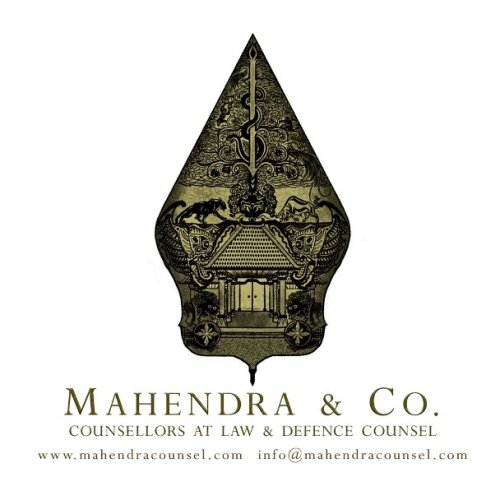Best Art & Cultural Property Law Lawyers in Jakarta
Share your needs with us, get contacted by law firms.
Free. Takes 2 min.
List of the best lawyers in Jakarta, Indonesia
About Art & Cultural Property Law in Jakarta, Indonesia
Art & Cultural Property Law in Jakarta, Indonesia, encompasses the legal frameworks surrounding the creation, transfer, protection, and restitution of art and cultural artifacts. These laws are designed to preserve the rich cultural heritage of Indonesia, which includes a diverse array of traditional crafts, significant archaeological sites, and ancient artworks. The legal landscape in Jakarta is shaped by both national legislation and international conventions to which Indonesia is a party, aiming to prevent illicit trafficking and ensure the protection of cultural heritage.
Why You May Need a Lawyer
There are several scenarios in which individuals or organizations might need legal assistance in Art & Cultural Property Law in Jakarta. These include:
- Disputes over the ownership of art or cultural property.
- Cases of illegal import or export of cultural artifacts.
- Legal protection for newly created artworks or traditional crafts.
- Claiming restitution of stolen or displaced cultural property.
- Handling intellectual property rights related to art and cultural heritage.
- Negotiating contracts for the sale or loan of artwork.
- Understanding your rights and duties when discovering an archaeological site or artifact.
Local Laws Overview
Key aspects of Art & Cultural Property Law in Jakarta, Indonesia, include:
- Law on Cultural Advancement (Law No. 5/2017): Addresses the protection and promotion of cultural objects.
- Law on the Protection of National Heritage (Law No. 10/1992): Provides a legal framework for safeguarding Indonesia's national heritage.
- Intellectual Property Law: Protects the rights of artists and creators concerning copyright, trademarks, and patents related to cultural expressions.
- International Conventions: Indonesia adheres to several conventions like UNESCO's 1970 Convention on preventing the illicit import, export, and transfer of ownership of cultural property.
Frequently Asked Questions
1. What is considered cultural property in Indonesia?
Cultural property includes artifacts, artworks, manuscripts, monuments, and archaeological sites with historical, artistic, or cultural significance.
2. How can I prove the ownership of an art or cultural item?
Ownership can be established through documentation like purchase receipts, contracts, provenance records, or registration with relevant authorities.
3. What are the penalties for illegally exporting cultural artifacts?
Penalties may include fines, imprisonment, and the seizure of unlawfully exported items.
4. Can cultural heritage be privately owned?
Yes, cultural heritage can be privately owned, but owners must comply with national laws and ensure the protection and conservation of the property.
5. How are disputes over art ownership resolved?
Disputes may be resolved through negotiation, mediation, arbitration, or litigation in accordance with Indonesian law.
6. What should I do if I discover an archaeological artifact?
Reported it to local authorities or the Ministry of Education and Culture to ensure proper handling in accordance with conservation laws.
7. Are there any incentives for preserving cultural property?
Indonesia offers various incentives, including grants, tax benefits, and technical assistance for preservation efforts.
8. How can artists protect their work in Indonesia?
Artists can protect their work through copyrights, registering their creations with Indonesian intellectual property offices, and using contracts that safeguard their rights.
9. What role do museums play in cultural property law?
Museums help in preserving, documenting, and exhibiting cultural property while ensuring compliance with legal and ethical standards.
10. Can foreign entities acquire cultural property in Indonesia?
Yes, but they must comply with national regulations and may need special permissions or adhere to strict export and import controls.
Additional Resources
For further information, consider contacting these resources:
- Ministry of Education and Culture: Responsible for cultural policy and regulation.
- Directorate General of Intellectual Property: Handles intellectual property rights related to the arts.
- Indonesian Heritage Trust (Badan Pelestarian Pusaka Indonesia): An organization focusing on heritage preservation.
- UNESCO Office Jakarta: Provides information and support regarding international cultural conventions.
Next Steps
If you seek legal assistance in Art & Cultural Property Law, consider the following steps:
- Consult a Lawyer: Contact a lawyer specializing in art and cultural property law for tailored legal advice.
- Gather Documentation: Collect any relevant documents, such as purchase records, contracts, and correspondence related to the art or cultural property.
- Understand Your Rights: Familiarize yourself with local and international laws that pertain to your situation.
- Reach Out to Relevant Authorities: Engage with governmental or non-governmental organizations focusing on cultural heritage if you require additional guidance or support.
Lawzana helps you find the best lawyers and law firms in Jakarta through a curated and pre-screened list of qualified legal professionals. Our platform offers rankings and detailed profiles of attorneys and law firms, allowing you to compare based on practice areas, including Art & Cultural Property Law, experience, and client feedback.
Each profile includes a description of the firm's areas of practice, client reviews, team members and partners, year of establishment, spoken languages, office locations, contact information, social media presence, and any published articles or resources. Most firms on our platform speak English and are experienced in both local and international legal matters.
Get a quote from top-rated law firms in Jakarta, Indonesia — quickly, securely, and without unnecessary hassle.
Disclaimer:
The information provided on this page is for general informational purposes only and does not constitute legal advice. While we strive to ensure the accuracy and relevance of the content, legal information may change over time, and interpretations of the law can vary. You should always consult with a qualified legal professional for advice specific to your situation.
We disclaim all liability for actions taken or not taken based on the content of this page. If you believe any information is incorrect or outdated, please contact us, and we will review and update it where appropriate.








![Kantor Advokat IP Partners [ Advokat, Pengacara, Mediator ]](https://lawzana.com/storage/firms/28937/17721205156178.jpg)





